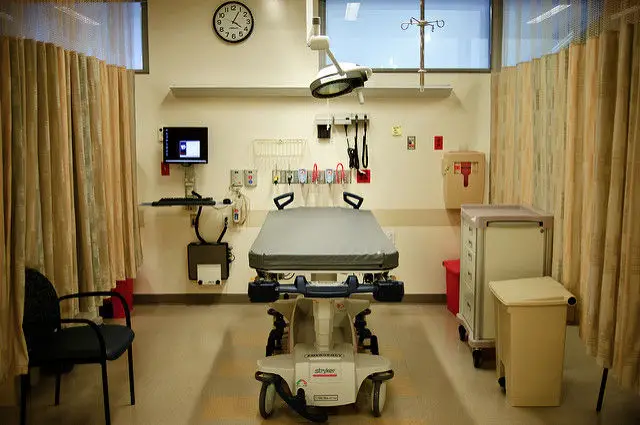There has been a surge in the number of operations being cancelled at the last minute at the Isle of Wight NHS Trust.
The trust cancelled 87 non-urgent operations, such as hip or knee surgeries, in the three months to June, the latest period covered by NHS England data.
This was an increase of 85% from the same period in 2017, when there were 47 last minute cancellations.
Bed or staff shortages
The data covers cancellations that were due to non-clinical reasons, such as bed or staff shortages.
OnTheWight has asked the Isle of Wight NHS the exact reason for the surge in cancellations.
The IW NHS took six days to issue the following statement, which appears to be pretty non-specific.
Nikki Turner, Director of Acute Services at Isle of Wight NHS Trust, said:
“I’d like to apologise to anyone who has had their surgery cancelled. It is frustrating for our patients and for our staff. The NHS across the country, including the Isle of Wight, has been under tremendous pressure since the turn of the year.
“We do everything we can to avoid cancelling surgery and give patients as much warning as possible, but there are a variety of reasons why that is sometimes necessary such as urgent, emergency and cancer patients taking priority and the need to comply with rules on single sex accommodation.
“Where we have to cancel this is an action of last resort and we try to rebook patients we have had to cancel as quickly as possible.”
“Enormous pressure” on the NHS
The Royal College of Surgeons has blamed “enormous pressure” on the NHS for the increasing number of cancellations in England.
It also warned the figures could be masking the true scale of the problem, as they do not include operations cancelled at more than 24 hours notice.
A last-minute cancellation is defined as being either on the day that a patient was due to arrive, after the patient has arrived, or on the day of the operation itself.
Critchley: “What’s happening to the NHS isn’t an accident”
Island Labour Chair, Julian Critchley , said:
“The NHS is under severe threat. I think there’s a danger of people hearing this so much that they tune out. But it’s vital that they tune back in. Island Labour has been warning since last year of the proposed cuts to provision at St Mary’s. National Labour has been warning about the impact of underfunding on the NHS across the country. Labour’s Shadow Health Spokesperson, Jonathan Ashworth, highlighted this when he visited the Island earlier this year.
“Instances like this, and the recent news that closures are planned of smaller GP surgeries, show that the NHS is facing an unprecedented crisis as a result of chronic underfunding. If we do not insist our government gives the NHS the funds it deserves, then it will disappear. There’ll be no ‘big bang’ announcement that it’s over. Instead, people will just find that when they need health care, it’s not available any more. At least, not for free, not without a long waiting list, and not here on the island.
“The local Conservative Party and Conservative MP will doubtless once again claim this is “scaremongering”. They made that claim when Island Labour broke the story that St Mary’s budget was to be significantly cut, yet that was true. They also made that claim when Labour said that vital services would be moved to the mainland, and that was also true. So when they claim that this gradual destruction of the NHS is scaremongering, Islanders should probably be right to feel concerned.
“What’s happening to the NHS isn’t an accident, or a natural disaster. Nor is it inevitable. It is the consequence of deliberate political choices which have been made by this Conservative government. And the only way we can save it from death by a thousand cuts is to make a deliberate political choice about our next government. There may well be a general election sooner than we think, as the Conservative/DUP coalition collapses under its own incompetence. When that happens, Islanders need to think very hard about whether they want to save the NHS, and vote accordingly.”
Stressful for patients and their families
Professor Cliff Shearman, vice president of the RCS, said:
“Having an operation that has been planned for months cancelled at short notice can be very stressful for patients and their families.
“Alongside practical considerations such as wasted time off work and rescheduling the surgery, patients will have to deal with the mental anguish of preparing for surgery all over again.
“They will also have to endure waiting longer in pain and discomfort, possibly unable to work or complete day-to-day tasks for themselves. In some cases, their condition may worsen.”
28 day rule
According to the NHS Constitution, the trust must offer a new date within a maximum period of 28 days after a non-urgent operation, such as hip or knee surgeries, has been cancelled.
If it is unable to do so, it must instead fund the treatment with another hospital and forfeit its payment from the NHS Clinical Commissioning Group that funds healthcare in the area.
National comparison
There were 18,806 last minute cancellations across England in the three months to June.
Of these, 11% of patients did not have their operations rescheduled within 28 days.
This rate is the second highest it has been since 2005, surpassed only in the preceding three months between January and March of this year, when it reached 12%.
Not enough free beds in hospitals
Professor Shearman, said,
“This will undoubtedly be down to the enormous pressures the NHS is facing.
“These include not enough free beds in hospitals, difficulties tackling the backlog of operations that built-up over the winter, and now coping with a very busy summer thanks to record temperatures.”
Extra funding to community services
An NHS England spokesman said:
“Only a small minority of operations are cancelled on the day, while 15,000 fewer people now wait a year for their operation compared with 2010.
“New guidance issued to trusts recently will see local health service leaders allocate extra funding to community services, like district nursing teams and outreach clinics, to help them care for more patients, freeing up hospital beds and staff to reduce surgery waiting lists.”
Article edit
14.00 Comment from Julian Critchley added
Thur 23/8: Response from NHS added
Article shared by Data Reporter as part of OnTheWight’s collaboration with Press Association and Urbs Media
Image: leecullivan under CC BY 2.0





